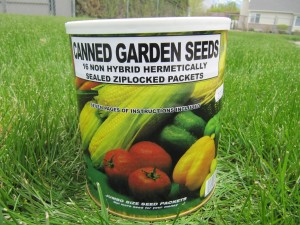I purchased a can of non-hybrid garden seeds. They are a good item to store for a time when seeds may be hard to obtain or become very expensive.
Why Non-Hybrids?
If you are trying to be self-sufficient, using hybrid seeds is not a good idea. The seed of hybrid vegetables does not grow true — you may not get taste, productivity, or even appearance. Only open pollinated, or “heirloom”, or “traditional” varieties will produce seed which, when saved and planted next year, will give you the same results as the parent plant.
Save your own seeds. This cuts gardening costs by 25% to 50%. Non-hybrids taste better. Many hybrids are now selling for high prices. When you save your own seeds, you only buy once.
A Can of Seeds
There are enough seeds to plant more than 3/4 acres. The varieties have been recommended by Utah State University for short season climates; with excellent adaptability for most regions. Complete instructions for planting are included. There are 16 varieties:
- Sweet Corn, Golden Bantam, 5 oz
- Spinach, Bloomsdale Longstanding, 10 gr
- Pepper, Yolo Wonder, 5 gr
- Peas, Lincoln, 5 oz
- Cabbage, Golden Acre, 10 gr
- Winter Squash, Waltham Butternut, 10 gr
- Swiss Chard, Lucullus, 10 gr
- Cucumber, Straight Eight, 10 gr
- Radish Champion , 10 gr
- Onion, Utah Yellow Sweet Spanish, 10 gr
- Lettuce, Romaine Paris Island Cos, 5 gr
- Pole Bean, Kentucky Wonder Brown, 5 oz
- Beet, Detroit Dark Red, 10 gr
- Carrot, Scarlet Nantes, 10 gr
- Squash Zucchini, Black Beauty, 10 gr
- Tomato, Rutgers PS, 5 gr
The unopened seeds should store for four years or more depending on storage temperature. The seeds have been carefully dried to their optimum moisture content to increase their storage life. The cooler the storage temperature, the longer the storage life of your seeds.
This can of seeds is ideal for emergency and preparedness storage. The best place to store your seed would be in a cool, dry, dark location such as a basement. For best results store unopened can in a refrigerator or freezer. You can replant the seeds of these non-hybrid varieties for future harvests.
Now all I have to do is to figure out how to grow them. :)


Growing emergency food in an ocean of hungry people, many of whom have guns, has never made sense to me. Community self-reliance does. Real community self-reliance depends upon local seed saving and production. Start a local seed library. Host a seed exchange pot luck dinner each fall in your home town. Encourage every gardener in your community to save some of their own seeds and come to the pot luck to trade for the other seeds they need. You can find detailed seed saving instructions on the website of this 20 year-old non-profit:
http://www.seedsave.org/issi/issi_904.html
Thanks for the tips. In the community where I live a lot of my neighbors are preparedness-minded and are more self-sufficient than I am. I will have to ask them if they are saving seeds and try your ideas.
I imagine you could write a book about the subject, then I noticed that you already have. “Basic Seed Saving” by Bill McDorman.